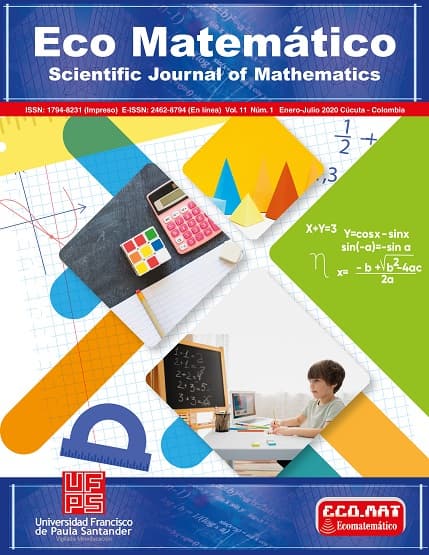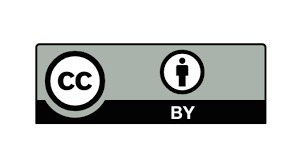Methodological strategy for the teaching of the pythagorean theorem in the eighth grade of the institution monseñor Jaime Prieto Amaya
Estrategia metodológica para la enseñanza del teorema de Pitágoras en el grado octavo de la institución monseñor Jaime Prieto Amaya
Main Article Content
This experimental quantitative research with a descriptive approach, which was developed in a period of time of one year with the participation of the teacher of the mathematics area and a total of 100 students who were in grade 8, arose due to the difficulties that the students presented. students in the application of the Pythagorean theorem in everyday life.
Due to this, the need arose to propose methodological strategies for the contextualization of the teaching of the Pythagorean Theorem and in this way, achieve a better understanding regarding this concept; For this reason, it was investigated with the students from a pre - test of prior knowledge which allowed to show the rhythms and styles of learning.
After this search for information, it was possible to corroborate that the students felt more comfortable when classes were held outside the classroom; In this way, the activities were more experiential and significant, which made it possible to relate the Pythagorean theorem in a transversal way with areas such as physical education, in terms of the identification of the right triangle in different spaces of the court, measurements and distances; on the other hand, in relation to the artistic area in the formation of triangles the rectangles from origami and the way to find their measurements for the creation of these figures.
The construction of this knowledge could be verified through the application of a post test which resulted in an improvement in the understanding of the practical use of the Pythagorean theorem in different contexts.
Downloads
Article Details
Arenas, M. Llanes.Rodríguez, R. (2013). Aprendizaje del Teorema de Pitágoras utilizando la estrategia de modelación a través del uso de Applets. Tecnológico de Monterrey, Campus Monterrey, México. http://funes.uniandes.edu.co/6201/1/ArenasAprendizajeALME2014.pdf
Campo, Y. Ladino, Y.(2015). Estrategia ludica para el aprendizaje del teorema de pitagoras en educandos del grado octavo.Univerisdad del Atlantico, Colombia. https://es.slideshare.net/LICENCIATURAMATEMATICAS/estrategia-ludica-para-el-aprendizaje-del-teorema-de-pitagoras-en-educandos-del-grado-octavo-52603242
Haldane, P. (2011). El teorema de Pitágoras construcción de algunos recursos didácticos. Tesis de Maestría en enseñanza de las ciencias exactas y naturales, Universidad nacional de Colombia, Bogotá. http://bdigital.unal.edu.co/4613/
Hernández, M. Martínez, R. Morán, D. Reverol, E. Urdaneta, R. (2011). Desarrollo de una estrategia metodológica como herramienta para fortalecer el aprendizaje de la genética-herencia.Monografías. https://www.monografias.com/trabajos87/desarrollo- estrategia-metodologica-fortalecer-aprendizaje-genetica-herencia.shtml
Herran, A. (2014).Creatividad, complejidad y formación: un enfoque transdisciplinar. Universidad Autónoma de Madrid, España. http://revistas.ucm.es/index.php/RCED/article/viewFile/43876/46485
Gutiérrez, M. Escartí, A. Pascual, C. (2011). Relaciones entre empatía, conducta prosocial, agresividad, autoeficacia y responsabilidad personal y social de los escolares. Universidad de Valencia. http://www.psicothema.com/psicothema.asp?id=3843
Maldonado, H. Vergel, M. (2016). Prácticas pedagógicas e índices de creatividad en la enseñabilidad de la física electromagnética. Universidad Francisco de Paula Santander. Cúcuta, Colombia http://revistalogos.policia.edu.co/index.php/rlct/article/view/27/html
Pacheco-Carrascal, N. (2016). La motivación y las matemáticas. ECO MATEMATICO, 7(1), 149–158. Universidad Francisco de Paula Santander. Cúcuta, Colombia https://revistas.ufps.edu.co/index.php/ecomatematico/article/view/1026
Osorio, L. (2011). Representaciones semióticas en el aprendizaje del Teorema de Pitágoras. Universidad Autónoma de Manizales, Colombia. http://repositorio.autonoma.edu.co/jspui/bitstream/11182/257/1/TESIS REPRESENTACIONES-EMIOTICAS.pdf
Rangel, J. (2011). El teorema de Pitágoras y el teorema de Thales. Instrumento de evaluación desde de las Pruebas Saber. Tesis de Maestría en enseñanza de las ciencias exactas y naturales, Universidad nacional de Colombia, Bogotá http://www.bdigital.unal.edu.co/4870/1/El_teorema_de_Pit%C3%A1goras_y_el_teorema_de_Thales_Instrumento_de_evaluaci%C3%B3n_desde_de_las_Pruebas_Saber.pdf
Rodríguez, R. (2010). Aprendizaje y Enseñanza de la Modelación: el caso de las ecuaciones diferenciales. Revista Latinoamericana de Matemática Educativa (RELIME), 13 (4-I), 191-10. http://funes.uniandes.edu.co/10670/1/Rodriguez2010Aprendizaje.pdf
Rodríguez, R., Quiroz, S. e Llanes, L. (2013). Competencias de modelación y uso de tecnología en Ecuaciones Diferenciales. Acta Latinoamericana de Matemática Educativa (ALME 26)
Santos, E. (2015). Propuesta metodológica de lectura en clase de matemáticas a través de textos de divulgación científica. http://www.fisem.org/www/union/revistas/2015/43/Artigo_2_20140730_Santos%20Baron%20Edimer.pdf
Vargas, G. Gamboa R (2012). La enseñanza del Teorema de Pitágoras: una experiencia en el aula con el uso del GeoGebra. Revista Uniciencia. Heredia, Costa Rica http://www.revistas.una.ac.cr/index.php/uniciencia/article/view/4945
Velásquez- Luna, S. J., Celis - Gutiérrez, J. L., & Hernandez Suárez, C. A. (2017). Evaluación contextualizada como estrategia docente para potenciar el desarrollo de competencias matemáticas en Pruebas Saber. ECO MATEMATICO, 8 S(1), 33–37. Universidad Francisco de Paula Santander. Cúcuta, Colombia







